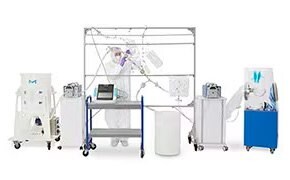mAbs Formulation
and Fill Finish
Products for Development and Manufacturing
Formulating, sterile filtering, and filling a drug product is complex but crucial. There are many excipient choices, filter options, and fill-finish technologies, each of which can have an impact on key attributes of the final dosage form including stability.
Formulation
Monoclonal antibodies (mAbs) can be formulated for subcutaneous or intravenous administration. Robust risk mitigation strategies during formulation are essential to ensure regulatory compliance and safety of the drug product for patients. Safe and effective formulation hinges on the reliable sourcing of high-quality excipients manufactured according to GMP (IPEC-PQG GMP Guide and/or EXCiPACT GMP Standard) and with specified low bioburden and endotoxin levels.
Successful mAbs formulation requires a range of excipients with different functionalities, including:
- Stabilizers: Crucial for minimizing the formation of aggregates, precipitates, and free drug to ensure mAb stability during formulation, storage, and administration.
- Viscosity reducing excipients: Essential for reducing the viscosity of the final formulation, enabling higher concentrated formulations, improving injectability, and reducing pain at the injection site, thereby enhancing therapeutic efficacy and patient compliance.
- pH adjusters and buffers, salts: Key for tailoring the formulation and administration medium composition based on the final formulation type (liquid or lyophilized), administration route, target pH, and stability of the mAb molecule.
- Cryoprotectants: Utilized in lyophilized formulations to stabilize mAbs and other biomolecules during the freeze-drying process and storage.
In addition, effective formulation depends on successful mixing of excipients and the active pharmaceutical ingredients to assure uniformity and consistency of the bulk drug product.
To help you be successful in your large molecule formulation, the following products are available for you:
- SAFC® Pharma Raw Materials and Excipients (buffers, salts, stabilizers, CIP solutions, viscosity reduction platform)
- Millipore® Single-Use Solutions (mixing, assemblies and storage systems, connectors)
- Millipore® Sampling Solution (offline system)
- Millipore® Services (single-use and filter validation, equipment installation, system qualification, system training, system services)
- BioReliance® Services (final product release testing, and stability testing services)
Related Categories
Our portfolio of pharmaceutical excipients offers everything you need for medicinal drug product.
Our Viscosity Reduction Platform enables subcutaneous formulation of highly concentrated proteins.
We offer low bioburden, endotoxin materials for biopharma formulation.
The Integritest® 5 automated test instrument enables non-destructive integrity testing to be performed inline or offline on filtration devices.
Mobius® single-use systems can be designed to include either single or redundant sterilizing filters.
Robust fluid management systems mitigate the risk of process contamination. By combining our portfolio of single-use and multi-use systems, we can support your process needs.
Related Resources
- Use of Stabilizers and Surfactants to Prevent Protein Aggregation
Read about critical factors in long-term stability of proteins, and how different stabilizers protect against mechanical and thermal stress.
- Whitepaper: Optimizing Poloxamer 188 for Use in Liquid Protein Formulation and Cell Culture Applications
Dive into stabilization mechanisms of poloxamer 188 and how to use attributes such as molecular weight and hydrophobicity to select the best option for liquid formulation and cell culture applications.
- Overcoming Excipient Risks and Challenges for Parenteral Formulations
Find out about the important role of excipients in parenteral formulations, a high-risk administration route. Learn how they improve stability and bioavailability of the API, and can enhance effectiveness of the drug.
- Parenteral Drugs: Ensuring Sterility and Minimizing Risks During Manufacturing
Learn strategies to help ensure the sterility of parenteral drugs and minimize risk during manufacturing of these high-risk applications.
- Addressing Viscosity Challenges for Subcutaneous Injections
This overview provides strategies for reducing the viscosity of high concentration drug formulations to enable subcutaneous injections for greater patient convenience and adherence.
- Whitepaper: Viscosity-Reducing Excipients for Protein Formulation
Read about the effect of protein viscosity on injection force and the platform’s ability to balance viscosity reduction with protein stability.
- Low NPI Sucrose for Biopharmaceutical Formulations
This article describes a purification process resulting in low nanoparticulate impurities sucrose, enabling more stable protein formulations.
- Whitepaper: Protecting Protein Stability with a Novel Grade of Sucrose
Get insights on nanoparticle impurities found in commercially available sucrose, their origin and impact on protein stability.
- Whitepaper: Application of Dry Granulation to Facilitate Raw Material Handling
Learn about the benefits of granulated raw materials over powder raw materials, and how their use can improve process efficiency and operator safety.
- Facilitate Handling of Bulk Powders with Dry Granulation
Handling bulk powders at a large scale in the pharmaceutical, biopharmaceutical, and bioprocessing setting is challenging. Compared to powders, granulated materials experience far less caking, have better flowability, and are easier to handle, even after long-term storage.
- Biopharmaceutical Application Guide
Explore products and services for mAb, vaccines, microbial, ADC, and plasma processes.
Explore Our Solutions
続きを確認するには、ログインするか、新規登録が必要です。
アカウントをお持ちではありませんか?










